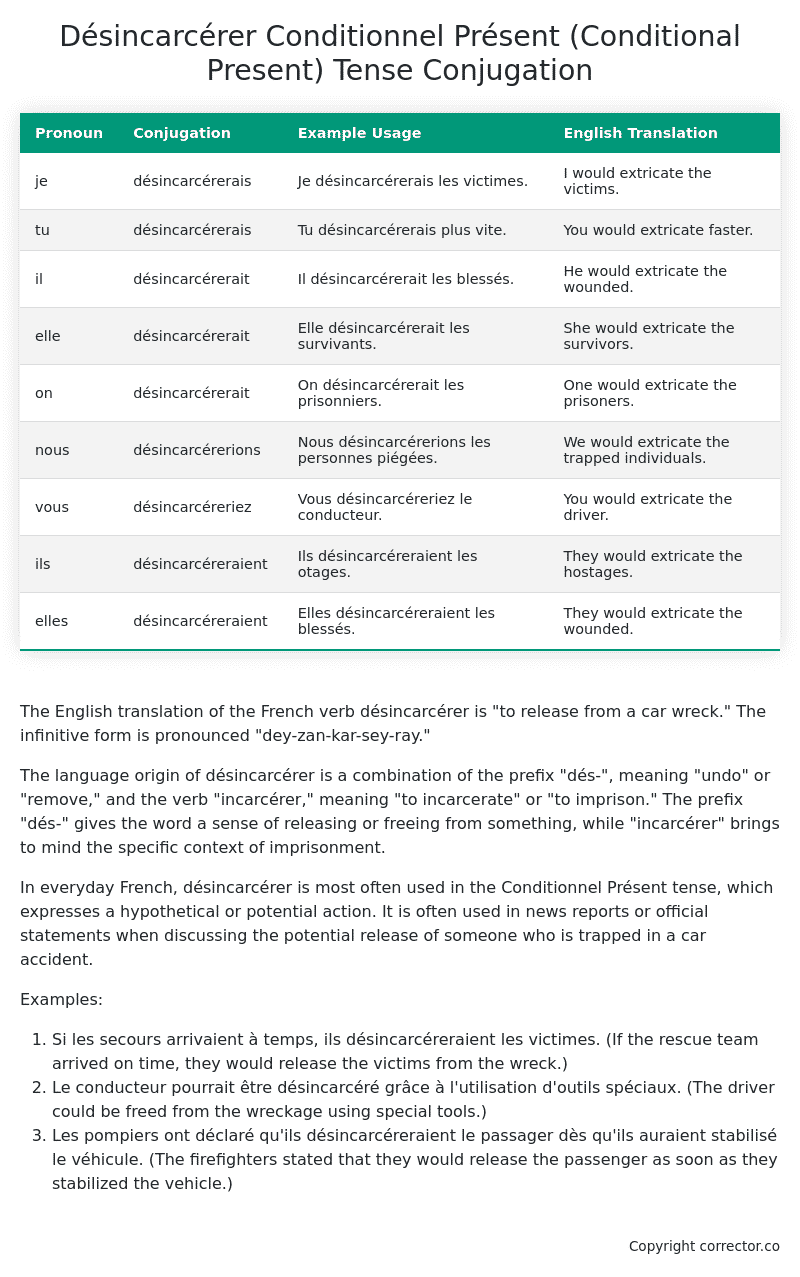Conditionnel Présent (Conditional Present) Tense Conjugation of the French Verb désincarcérer
Introduction to the verb désincarcérer
The English translation of the French verb désincarcérer is “to release from a car wreck.” The infinitive form is pronounced “dey-zan-kar-sey-ray.”
The language origin of désincarcérer is a combination of the prefix “dés-“, meaning “undo” or “remove,” and the verb “incarcérer,” meaning “to incarcerate” or “to imprison.” The prefix “dés-” gives the word a sense of releasing or freeing from something, while “incarcérer” brings to mind the specific context of imprisonment.
In everyday French, désincarcérer is most often used in the Conditionnel Présent tense, which expresses a hypothetical or potential action. It is often used in news reports or official statements when discussing the potential release of someone who is trapped in a car accident.
Examples:
- Si les secours arrivaient à temps, ils désincarcéreraient les victimes. (If the rescue team arrived on time, they would release the victims from the wreck.)
- Le conducteur pourrait être désincarcéré grâce à l’utilisation d’outils spéciaux. (The driver could be freed from the wreckage using special tools.)
- Les pompiers ont déclaré qu’ils désincarcéreraient le passager dès qu’ils auraient stabilisé le véhicule. (The firefighters stated that they would release the passenger as soon as they stabilized the vehicle.)
Table of the Conditionnel Présent (Conditional Present) Tense Conjugation of désincarcérer
| Pronoun | Conjugation | Example Usage | English Translation |
|---|---|---|---|
| je | désincarcérerais | Je désincarcérerais les victimes. | I would extricate the victims. |
| tu | désincarcérerais | Tu désincarcérerais plus vite. | You would extricate faster. |
| il | désincarcérerait | Il désincarcérerait les blessés. | He would extricate the wounded. |
| elle | désincarcérerait | Elle désincarcérerait les survivants. | She would extricate the survivors. |
| on | désincarcérerait | On désincarcérerait les prisonniers. | One would extricate the prisoners. |
| nous | désincarcérerions | Nous désincarcérerions les personnes piégées. | We would extricate the trapped individuals. |
| vous | désincarcéreriez | Vous désincarcéreriez le conducteur. | You would extricate the driver. |
| ils | désincarcéreraient | Ils désincarcéreraient les otages. | They would extricate the hostages. |
| elles | désincarcéreraient | Elles désincarcéreraient les blessés. | They would extricate the wounded. |
Other Conjugations for Désincarcérer.
Le Present (Present Tense) Conjugation of the French Verb désincarcérer
Imparfait (Imperfect) Tense Conjugation of the French Verb désincarcérer
Passé Simple (Simple Past) Tense Conjugation of the French Verb désincarcérer
Passé Composé (Present Perfect) Tense Conjugation of the French Verb désincarcérer
Futur Simple (Simple Future) Tense Conjugation of the French Verb désincarcérer
Futur Proche (Near Future) Tense Conjugation of the French Verb désincarcérer
Plus-que-parfait (Pluperfect) Tense Conjugation of the French Verb désincarcérer
Passé Antérieur (Past Anterior) Tense Conjugation of the French Verb désincarcérer
Futur Antérieur (Future Anterior) Tense Conjugation of the French Verb désincarcérer
Subjonctif Présent (Subjunctive Present) Tense Conjugation of the French Verb désincarcérer
Subjonctif Passé (Subjunctive Past) Tense Conjugation of the French Verb désincarcérer
Subjonctif Imparfait (Subjunctive Imperfect) Tense Conjugation of the French Verb désincarcérer
Conditionnel Présent (Conditional Present) Tense Conjugation of the French Verb désincarcérer (this article)
Conditionnel Passé (Conditional Past) Tense Conjugation of the French Verb désincarcérer
L’impératif Présent (Imperative Present) Tense Conjugation of the French Verb désincarcérer
L’infinitif Présent (Infinitive Present) Tense Conjugation of the French Verb désincarcérer
Struggling with French verbs or the language in general? Why not use our free French Grammar Checker – no registration required!
Get a FREE Download Study Sheet of this Conjugation 🔥
Simply right click the image below, click “save image” and get your free reference for the désincarcérer Conditionnel Présent tense conjugation!

Désincarcérer – About the French Conditionnel Présent (Conditional Present) Tense
Formation
Common Everyday Usage Patterns
Expressing Polite Requests
Expressing Hypothetical Situations
Expressing Doubt or Uncertainty
Interactions with Other Tenses
Present Tense
Past Tense
Future Tense
Conditional Perfect
Summary
Want More?
I hope you enjoyed this article on the verb désincarcérer. Still in a learning mood? Check out another TOTALLY random French verb conjugation!


